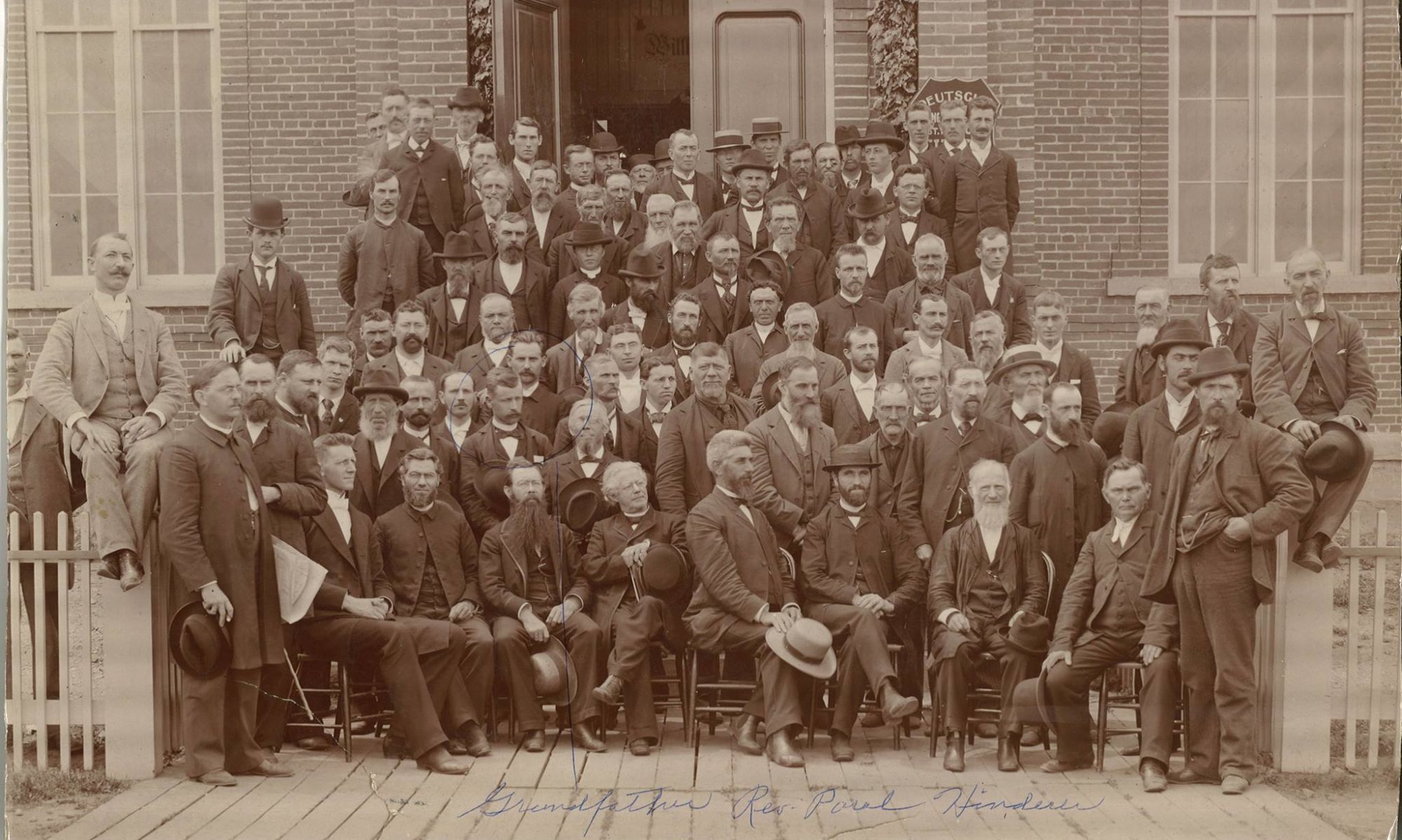It sure is easy to get overwhelmed and sidetracked when reading the BORAM. There is so much information. Where do I begin? I have had a number of false starts.
I find the BORAM so interesting I want to share all of it. Of course, not everybody wants to read it all. What parts do I share? An overview might be a good place to start.
The Congregation and District report gives a rather comprehensive look at what the BORAM contains. In all honesty, there are portions which don’t make any sense to me. Later portions of the BORAM offer more information on specific Areas of Ministry. That is also where we will be taking a look at the Memorials. What is a Memorial anyway?
A Memorial is the method by which items of business are submitted to the Convention for consideration and action. A memorial’s call for action can be as simple as accepting a report with thanks, or introducing some controversial topic. The thing to remember is Synod had guidelines for how and when Memorials are submitted. These guidelines may seem strict, but any layman, pastor, congregation, district, etc. can submit a memorial. The process isn’t some secret Synod hides. They just have a process in place so it is all done in decency and order.
There are five Memorials currently printed in the BORAM. Two of them were submitted by Districts, one by a pastor, one by a school coordinator, and one by a WELS member. We will be looking at those later. More Memorials will be distributed by Synod in the coming weeks as they become available.
I actually wrote a memorial for the MN District Convention concerning the Bible translation. The issue at hand was a mute issue by the time I had the Memorial written. I always appreciate the journey more than the destination. Attempting to put my thoughts concerning the BORAM onto paper is being quite the journey. I don’t think I can claim to understand it until I can write about it. Thanks for joining me on this journey.
One spot my journey often takes me is the Seminary Essay Archive files. This is amazing reading, folks. I can get so lost in those archives. Let me give you an example. One of the orders of business which will come before the convention is making amendments to the Synod Constitution. I decided to do a little research and see how these issues were addressed in the past. I ended up reading about if a constitutional amendment should contain doctrinal statements.
Reading about whether a constitutional amendment should contain doctrinal statements is not something I am inclined to research and read about. However, my BORAM journey took me down this little side path and I think I will be a better delegate for it. These side trips got even more interesting when considering the fellowship topic which will come before the convention.
So I come back to be original question of “Where do i start?” The Congregation and District report is below. I grant that is is probably more information than many people want to know.
The list below shows the Areas of Ministry covered in the Congregation and District report. Simply click on an item to see a drop down box containing more information taken from the BORAM. I grant that it is probably more information than many people want to know.
So I come back to be original question of “Where do i start?” It seems I have been working hard to build a foundation on which to build future understanding. From hereon I hope to get into the nitty gritty of specific reports and memorials. As I mentioned above, I love the Seminary Archives. I will offer historical background to proposed actions where applicable.
[su_accordion]
The Congregation and District Ministry portion of the synod’s ministry financial plan (budget) includes the Conference of Presidents (COP) and all entities overseen by the COP. These include:
[su_spoiler title=”Conference of Presidents” icon=”arrow”]
- Regular and special meetings of the Conference of Presidents and the Assignment Committee
- Travel and other expenses related to the district presidents’ work
- Pastoral assistants provided to the congregations served by the district presidents
- Partial cost of the vicar program
- Support Committee Grants and assistance provided to needy retired called workers and their spouses
[/su_spoiler]
[su_spoiler title=”Commission on Inter-Church Relations” icon=”arrow”]
- Regular meetings of the commission
- Travel expenses related to inter-church relations
- Annual support for the Confessional Evangelical Lutheran Conference (CELC)
- Financial support for sister church bodies as appropriate
[/su_spoiler]
[su_spoiler title=”Ministry of Christian Giving” icon=”arrow”]
- Administration and staff salaries and office expenses
- Salaries and travel expenses for current and deferred Christian giving counselors
- Expenses of counselor training and consultation
- Cost of promotions and appeals
[/su_spoiler]
[su_spoiler title=”Communication Services” icon=”arrow”]
- WELS Connection, WELS Connection Close-up, “Together” electronic newsletter, partial funding for Forward in Christ editorial staff, WELS Annual Report
- Book of Reports and Memorials, Report to the Twelve Districts, Proceedings
- Content production and management of WELS’ web presence, including wels.net and social media outlets
- Graphic design services to all areas of ministry
- Coordination of public responses and communications of the synod
[/su_spoiler]
[su_spoiler title=”Synod Nominating Committee” icon=”arrow”]
- Selection of nominees for convention elections
[/su_spoiler]
[su_spoiler title=”Congregation and Ministry Support Group” icon=”arrow”]
- Commission on Congregational Counseling
- Commission on Worship
- Commission on Evangelism
- Commission on Special Ministries
- Commission on Adult Discipleship
- Commission on Youth and Family Ministry
- Commission on Lutheran Schools
[/su_spoiler]
[su_spoiler title=”Continuing Education for Called Workers Committee” icon=”arrow”]
- Coordination of efforts to help called workers grow in faith, knowledge, and skill
[/su_spoiler]
[su_spoiler title=”Translation Liaison Committee” icon=”arrow”]
- Evaluation of major Bible translations and communication with their editors and publishers, including suggestions for improvements to translations
[/su_spoiler]
[su_spoiler title=”District ministries and functions” icon=”arrow”]
- Costs related to the functions of the districts, district praesidia, and circuit pastors
- District conventions and other meetings
- District committees
[/su_spoiler]
[su_spoiler title=”The Conference of Presidents” icon=”arrow”]
The Conference of Presidents (COP) is composed of the 12 district presidents, elected by their respective districts, as well as the synod president and the two synod vice presidents, all of whom are elected by the synod convention. The synod president serves as the chairman of the COP. The synod secretary, also elected by the synod in convention, serves as a non-voting advisory member of the COP.
The COP meets in person three times annually for regular meetings and monthly via teleconference between regular meetings. The COP also meets at Martin Luther College and Wisconsin Lutheran Seminary in May each year in its role as the Assignment Committee of the synod.
[/su_spoiler]
[su_spoiler title=”The COP is divided into three standing committees: Doctrine, Called Workers, and Congregations” icon=”arrow”]
The Conference of Presidents is entrusted with the following broad responsibilities:
- Overseeing all matters of doctrine and practice to ensure that the synod, its congregations, its called workers, and other affiliated entities remain faithful to the Scriptures and the Confessions of the Evangelical Lutheran Church.
- Working to maintain and strengthen the synod’s unity in doctrine and practice and in its purpose and mission.
- Assisting congregations in the calling process by providing candidates for divine calls and appropriate advice.
- Providing counsel to congregations either directly or through the circuit pastors of the district in matters dealing with ministry, governance, and relationships between congregations and called workers.
- Overseeing the various ways in which congregations and individual members provide financial support for the work of the synod, including ongoing instruction in Christian stewardship, encouragement of Congregation Mission Offerings (CMO), and planning for special offerings that may be held periodically.
- Overseeing and serving as the calling body for the work of the Ministry of Christian Giving, as well as for all units of the Congregation and Ministry Support Group. It also oversees the other areas included in Congregation and District Ministry, including Communications Services, the Commission on Inter-Church Relations, and the Support Committee.
- Communicating and promoting the synod’s mission and ministry in the districts.
- Providing counsel to the synod president as he carries out his responsibilities.
- Overseeing the planning of the synod convention.
The COP spends significant time at each meeting reviewing issues relating to calls and vacancies, addressing issues that affect congregations and called workers, and discussing specific matters of doctrine and practice. The group functions primarily as a “conference” to provide a forum for district presidents to confer with each other and to provide and receive guidance and input from one another.
The COP works in close cooperation and consultation with the Synodical Council (SC). Three district presidents, along with the synod president and two vice presidents, serve as members of the SC.
[/su_spoiler]
[su_spoiler title=”Overseeing matters of doctrine and practice” icon=”arrow”]
Each district president, along with his district officers, is entrusted with the responsibility of overseeing doctrine and practice in his district, including carrying out discipline of called workers when Christian love and faithfulness to God’s Word require it. To assure as much consistency as possible from district to district, the COP devotes considerable time in its meetings to discussing practical situations, providing a forum for mutual advice and encouragement.
From time to time, the COP as a group addresses doctrinal issues or matters of practice that affect the entire synod in an effort to strengthen the doctrinal unity we enjoy. This may involve clarifying and communicating doctrinal positions, addressing specific issues after in-depth study, and producing (or overseeing the production of) documents that summarize scriptural doctrines and evangelical practice. The results of efforts are intended to be pastoral and evangelical in nature, not in any way formulating new canon law in a legalistic way.
The COP is fully committed to the biblical principle of Christian freedom in matters of adiaphora (things neither commanded nor forbidden by Scripture); at the same time it continues to encourage called workers and lay leaders to exercise their Christian freedom with wisdom, brotherly love, and extensive consultation with others in our fellowship who may be affected. The COP continues to encourage open and brotherly discussion of such things as worship style, outreach efforts, and congregational organization. The COP believes that such discussion, when done in a spirit of Christian love and based on an ongoing study of the Scriptures, is essential to maintaining our synodical unity, a correct understanding of Christian freedom, and our clear identity as a confessional Lutheran church body.
The COP has recognized its responsibility in this area of its work and has maintained a high standard in producing and approving doctrinal studies and practical policies. But while the COP is responsible for supervising, maintaining, and strengthening unity of doctrine and practice, a practical reality for members of the COP and its Doctrine Committee is that, due to the press of other duties and responsibilities, the length of time needed to produce sound scriptural study documents or doctrinal statements can be unduly extended.
To provide assistance in addressing doctrinal and practical issues in a timely manner and in keeping with the gifts the Lord provides to his Church, the COP has recognized that at times it can better carry out such work through the use of ad hoc committees appointed to address a specific subject, rather than the appointment of a standing doctrinal commission or by assigning the work exclusively to the Doctrine Committee of the Conference of Presidents. Work produced by such committees is then submitted to the COP for approval and for public distribution.
[/su_spoiler]
[su_spoiler title=”Assignment of ministerial candidates” icon=”arrow”]
In its role as the Assignment Committee of the synod, the COP continually monitors the number of candidates graduating from Martin Luther College (MLC) and Wisconsin Lutheran Seminary (WLS). The vast majority of assignments are made in May, with a smaller number assigned after the mid-year graduation at MLC.
The Assignment Committee also assigns third-year seminary students to their place of vicarship. These assignments are made by the COP after extensive consultation with Wisconsin Lutheran Seminary and the Board for Home Missions. Since the vicar year is actually a part of the seminary’s program of education, the seminary provides extensive input into the vicar assignment process to ensure that the candidates are placed in locations where they can receive thorough training in the practical aspects of the pastoral ministry.
Candidates who are identified as having gifts for evangelism/outreach are often assigned to supervising pastors with proven gifts for the same so that the vicar’s evangelism/outreach gifts may be further developed. The “Vicar in a Mission Setting” program has worked well to provide outreach-ready graduates for assignment.
[/su_spoiler]
[su_spoiler title=”Continuing education for called workers” icon=”arrow”]
Acting on a recommendation from the Ad Hoc Commission, the 2009 convention called for the establishment of a flexible program of continuing education for called workers. The Continuing Education for Called Workers Committee (CECW) began to develop such a program shortly thereafter. Significant progress has been made and will be outlined in a report from the CECW to the 2017 convention (see p. 16).
Process for regaining eligibility to serve as a called worker The COP addressed the process by which called workers who have lost their eligibility to serve in the public ministry can seek to have that eligibility restored. In the case of pastors, this status of being eligible for a divine call into the pastoral ministry is referred to as candidatus reverendi ministerii (CRM). In the case of teachers, this status is referred to as “eligible and available” (E & A) for a divine call into the teaching ministry.
Decisions are made based on the current and past circumstances, letters of recommendation, and steps taken by the former called worker to resolve any outstanding issues that may be a hindrance to serving. Guiding the final decision is a commitment to be sure that biblical qualifications for the public ministry are met.
Previously, the decision whether or not to restore a person’s eligibility to serve in the public ministry was solely the responsibility of the praesidium of the district where the worker had previously served.
Because such decisions do not affect only one district but in fact may have an impact on any district of the synod (since eligibility affirms that a worker can serve anywhere), the COP has added a step to the process for restoring CRM or E & A status.
When a district president receives a formal request for restoration of eligibility, he reviews the information with his district praesidium. He then brings the matter to the entire COP for advice and input. Once that advice and input is given by the COP, the district president, together with the rest of the district praesidium, makes the final decision. This process provides broader input and a synod wide perspective prior to a decision.
[/su_spoiler]
[su_spoiler title=”Funding for the synod’s mission and ministry” icon=”arrow”]
While the SC is responsible for formulating and recommending the synod’s ministry program and the financial plan that supports it, the COP is responsible for funding the ministry program adopted by the synod in convention.
The COP operates under the principle that the foundational support for the mission and ministry of the synod is the Congregation Mission Offering (CMO). Other sources of financial support, such as gifts from individuals, bequests, grants from foundations, etc., are great blessings and play an important role in providing the resources necessary to carry out the synod’s work. Gifts from these sources can vary widely from year to year; CMO, on the other hand, has been a more consistent and predictable source of financial support.
The COP works to encourage congregations to increase their CMO commitments and to meet or exceed those commitments by the end of the year. CMO over the past ten years has been flat, while costs continue to rise. The total CMO received has not kept pace with inflation.
In recent years, other unexpected gifts have made it possible to avoid serious reductions in ministry, but such sources of financial support cannot be assumed. The COP has discussed ways to foster Spirit-worked generosity and to encourage increased CMO to enable the synod to maintain and even to expand its mission and ministry. Included in these plans is the production of videos in which each district president will deliver a message to his district describing the importance of CMO in maintaining and expanding the synod’s mission and ministry.
The vast majority of congregations provide financial support for the synod’s work through CMO and other gifts. There are a number of congregations, for various reasons, that provide no CMO support for the work we do together as a synod. The district presidents and circuit pastors will continue to encourage these congregations to participate in the joy of supporting our synod’s work to the extent that they are able.
The COP has been working with the Ministry of Christian Giving and WELS Communication Services to develop ways to communicate with congregations regarding the importance of CMO.
The COP is also working with the Ministry of Christian Giving to put into place a “Mission and Ministry” Sunday. It will be similar in purpose to mission festivals and to the “Walking Together” emphasis in past years, namely, to provide helpful information about the work that we do together as a synod and to encourage congregations and individuals to provide financial support for that work.
Due to the celebration of the 500th anniversary of the Lutheran Reformation in 2017, the COP will encourage all congregations to set aside a Sunday for this purpose in November. In future years, the plan is to hold the WELS Mission and Ministry Sunday in October.
Need for called worker recruitment Vacancies in both pastor and teacher positions have been increasing in recent years, and the current supply of candidates has not been able to keep pace with the need. The COP will be encouraging increased efforts by pastors, teachers, congregations, parents, and grandparents to recruit young people for full-time ministry.
Capital debt retired ahead of schedule In 2008 all capital debt of the synod was combined into a single consolidated debt. The total debt at that time was $22.4 million. The decision was made in 2008 to begin the effort to eliminate the debt through a special offering called the Year of Jubilee.
Efforts to repay the debt began with an initial synod wide special offering called the “Year of Jubilee” offering. Through that offering and in the years that followed, the people of the synod brought gifts for debt retirement totaling approximately $5 million. A plan was then put in place to amortize the remaining debt by the end of 2018 by budgeting for annual payments of $1.6 million.
Last year, with the desire to retire the debt ahead of schedule, the Conference of Presidents authorized a second special offering called the “One in Christ” offering. The people of the synod responded again with gifts of $3.1 million. Those additional gifts coupled with regular payments since that time made it possible for the Synodical Council to make the final payment on the debt last December.
The synod is now completely debt-free. Dollars previously set aside for debt payment can now be used to support the mission and ministry of the synod. This remarkable achievement, accomplished during a period of economic uncertainty, is truly a blessing for which we can be thankful to God. We humbly acknowledge that it happened only by God’s grace and by the power of the gospel working in the hearts of his people.
[/su_spoiler]
[su_spoiler title=”Ministry of Christian Giving review” icon=”arrow”]
The 2015 synod convention directed that a special committee be appointed to conduct a thorough review and analysis of the WELS Ministry of Christian Giving (MCG). Since the MCG reports to the COP, the committee’s draft report was shared with the COP in preparation for its submission to the 2017 convention. The committee’s report and recommendations can be found on p. 35.
As the calling body for the Ministry of Christian Giving, the COP has extended calls to fill vacancies on the Ministry of Christian Giving staff created by retirements.
[/su_spoiler]
[su_spoiler title=”Congregation and Ministry Support Group” icon=”arrow”]
Since 2009 what had been the Board for Parish Services has been restructured into the Congregation and Ministry Support Group (CMSG). The most significant change in the restructuring was the placement of the various commissions of the CMSG under the direct supervision of the COP. This change has been highly beneficial, since the COP now has a better understanding of the work being carried out and is in a better position to promote and support it.
Some CMSG entities are served by full-time directors (Lutheran Schools, Worship, Evangelism, Special Ministries, and Congregational Counseling); these directors are called by the COP. The chairman of each commission is elected by the synod in convention; members of all commissions are appointed by the COP. Each of these commissions will report to this convention.
The Commission on Congregational Counseling (CCC) was first established by the COP in 2010. Pastor Jonathan Hein serves as the director of the CCC. Initially Hein remained in the congregation he served rather than being based at the WELS Center for Mission and Ministry, with the synod providing a full-time pastoral assistant. The first call extended to Pastor Hein was to serve two one-year terms, but he has since accepted the call to serve permanently in this position while continuing to serve in his congregation.
Discussions are ongoing regarding the best way for the CMSG to be organized and how the various commissions can work together most effectively. It should be noted that one of the bylaw changes recommended by the COP is that this entity be renamed “Congregational Services” (see p. 220).
At its April 2017 meeting, the COP extended a call for the position of director of discipleship, who will serve both the Commission on Youth and Family Ministry and the Commission on Adult Discipleship. Funding for this position has been included in the ministry financial plan proposed by the Synodical Council.
[/su_spoiler]
[su_spoiler title=”Student debt at the ministerial education schools” icon=”arrow”]
The COP continues to monitor the level of student debt incurred by those who are preparing for the public ministry in our synod. Such debt can have a serious impact on the financial situation of called workers as they graduate and begin their service. Discussions have been held with Martin Luther College (MLC) regarding ways that the debt burden can be reduced.
The COP approved MLC’s proposal to encourage congregations to participate in providing financial assistance to their members who are studying for the public ministry, with MLC then providing matching funds to increase the amount provided.
The Congregational Partnership Grant Program was begun as a pilot program last year and proved to be successful. It will be expanded in the coming years. In addition, the governing board of MLC has been working to adopt only modest tuition increases to encourage more students to attend and to benefit those who do enroll.
[/su_spoiler]
[su_spoiler title=”Reformation 500” icon=”arrow”]
A special committee has been working to plan various ways for the synod to commemorate the 500th anniversary of the Lutheran Reformation. Included in the plans are various Reformation-related publications, a Reformation 500 website, special events, and the production of a new docu-drama film on the life and work of Martin Luther. A special screening of this movie will take place during the convention. In addition to these synodical efforts, special joint Reformation worship services will be held in various places throughout the synod.
[su_spoiler title=”Principal training and urban ministry” icon=”arrow”]
The COP has been actively involved with the Commission on Lutheran Schools and Martin Luther College to address two significant needs. One of those is the need for implementing ways to increase the number of qualified principal candidates. A special principal training program was begun several years ago to assign new graduates to work for three years under the tutelage of a veteran principal. After three years of training, the teacher would then be re- assigned to another school to serve as a principal.
Ideally, the COP prefers not to assign new graduates of Martin Luther College as principals, recognizing that it is difficult to develop good teaching skills while also having the administrative responsibilities of principal. In view of that preference, the COP adopted the following resolution:
- Beginning in May, 2017, we will make every effort not to assign candidates as principals or principal apprentices. Instead, we will encourage congregations to call from the field those who have attained—or are working toward—WELS Principal Credentials. Our goal will be not to assign principals or principal apprentices after May 2021.
- We understand that there will be a transition time in the next three to five years as we work toward full implementation. This includes COP encouragement for congregations to meet or exceed the synod-adopted guidelines for principal administration time and compensation.
- As this is implemented, the COP will work with the Commission on Lutheran Schools and congregations to fill principal vacancies in an appropriate way.
The COP also recommends that synod certification for principals include the WELS Principal Credential that meets or exceeds the competencies outlined in the WELS Principal Standards.
Given the shortage of principals, the COP will strive to avoid assigning candidates as principal apprentices, but there may be a need to do so in a limited way until the plans for the principal training program are fully implemented and able to supply the need for principals.
The other matter addressed by the COP is the increasing need for students who are trained and equipped to serve in the synod’s growing urban education programs. The COP approved a plan to implement a one-year apprenticeship (similar to the vicar program) in urban settings. Martin Luther College has also increased its efforts to provide training in urban ministry.
In addition to those steps, meetings held early in 2017 were attended by representatives of various constituencies in our synod to discuss the challenges of providing a sufficient number of qualified candidates for urban schools. As a result of those meetings, several special committees have been formed to explore the options available and to recommend the best course of action.
[/su_spoiler]
[su_spoiler title=”Guidelines for special conferences and events” icon=”arrow”]
There are times when organizations and groups plan events and conferences. The COP has adopted the following guidelines to assist those who are making the plans.
- If the event is solely for your district or regional in nature, please contact your district president well in advance and actively involve him as you begin making plans for the event because he is responsible for doctrine and practice in his district. If it is multi-district in nature, contact the synod president who will, in turn, contact the Conference of Presidents.
- Give careful thought as to whom you ask to give presentations. As much as possible, we encourage using WELS presenters.
- We recognize that there may be people outside of our fellowship who have expertise in a particular field that may be helpful to your audience. If you feel compelled to recruit such a presenter, you will want to determine whether false doctrine could be brought into the presentation or spiritual truths could be taught. If that is the case, such a presentation should be avoided.
- Be sure to instruct presenters who are outside our fellowship about not opening or closing the presentation with prayer. It may be best to ask at the outset of your planning, “Is there someone in our fellowship who can share the same information, but with a Lutheran and scripturally sound point of view?”
- We recognize that women may well be more appropriate for teaching women in many contexts. Be careful to observe the biblical roles of man and woman so that women are not teaching men in such a way as to exercise authority over men.
- Good scriptural and Lutheran theology partnered with gospel motivation should drive all biblical presentations.
Because we are rightly sensitive to “church growth” philosophy and methodology, evangelicalism, Romanism, a theology of glory, and other such false teachings, do any of your presentations appear to come from those backgrounds? Will people who see your promotional materials draw wrong conclusions? What message is being sent? What confession is being made?
Finally, the COP thanks you for keeping these guidelines under consideration as you plan events. The members of the COP want to support your efforts and are confident of your brotherly cooperation. They are always willing to answer any questions about these guidelines and will gladly offer clarification. May our Lord Jesus be glorified by all we do!
[/su_spoiler]
[su_spoiler title=”Bible translations” icon=”arrow”]
The Holman Christian Standard Bible has undergone a significant revision. It has now been renamed the Christian Standard Bible. Working with the Translation Liaison Committee, the COP appointed a committee to conduct a thorough review of the revised translation and to submit its conclusions when completed. The Christian Standard Bible Review Committee will report to the 2017 convention (see p. 15).
The Evangelical Heritage Version, a new translation undertaken by a group of WELS and Evangelical Lutheran Synod pastors and scholars, is nearing completion and is expected to be released in its entirety within the next two years. The Gospels and Psalms will be published in a separate volume this summer by Northwestern Publishing House. It’s expected that a review of the entire translation will be requested once the entire Bible is published and made available for sale by NPH.
[/su_spoiler]
[su_spoiler title=”Fellowship practices in our schools” icon=”arrow”]
In 2015 the COP prepared a special “toolbox” of materials and resources for addressing fellowship issues in WELS schools. This was forwarded to high schools and colleges in our fellowship and has been studied carefully by the faculties and the governing boards of most of our WELS high schools. The COP encourages ongoing study and discussion of the biblical principles involved and how those principles can be faithfully applied. The matter is also a subject of continuing discussions between the Doctrine Committee of the COP and the Evangelical Lutheran Synod Board of Doctrine. We look for those discussions to continue in the fall of 2017.
Using the gifts of women in administrative roles
The COP, together with the Commission on Lutheran Schools, has undertaken a study of how the gifts and skills of women teachers can be utilized in ways that are in keeping with biblical principles. The study will be shared with the synod when it is completed.
Calling at synodical schools
The current bylaws outline a procedure for gathering nominations for those who serve on the faculties of our synodical schools. There are a number of elements of this procedure that cause some difficulties in the calling process. The COP has directed President Schroeder to appoint a committee to review the current system and to make possible recommendations for bylaw changes to be considered by the 2019 synod in convention if such changes appear to be necessary and beneficial.
[/su_spoiler]
[su_spoiler title=”Preparation of delegates to the synod convention” icon=”arrow”]
In the past some delegates to synod conventions have expressed their view that they were not adequately prepared and equipped to serve as delegates. The COP has worked with WELS Communication Services to improve this preparation process. Delegates to the 2017 convention will be surveyed to determine whether these changes have helped them to feel informed and equipped to serve as delegates.
[/su_spoiler]
[su_spoiler title=”Military chaplaincy” icon=”arrow”]
The COP received a request to re-examine the issue of participation in the military chaplaincy program due to possible changes in the way the program functions in today’s armed forces. A special committee was appointed to study the matter. The following is the report and recommendations of that committee, which the COP received with thanks and approved in September 2016.
Though there have been significant, meaningful changes in the military chaplaincy since the 1950s— changes which have granted more safeguards for those serving in the military chaplaincy—it is nonetheless the recommendation of the Military Chaplaincy Study Committee that the changes are not such that would allow us to participate in the military chaplaincy at this time.
- The military chaplaincy continues to conflict with the doctrine of the two kingdoms because in the military chaplaincy the government has created and operates a spiritual office which exists to care for souls with the Means of Grace—or whatever religious text and rites a group regards as true.
- The military chaplaincy as currently constituted is built on, operates from, and supports the foundational idea that all religious beliefs are equally valid.
- The military chaplaincy also continues to conflict with the doctrine of the divine call because service in that office, which uses the Keys as a military chaplain, requires more than the Call of the Lord through his Church; it also requires the approval of the military. In addition, the military reserves for itself the unilateral right to end one’s use of the Keys as a military chaplain.
Encouragement
- We would also like to offer our encouragement that we as a synod do absolutely everything within our power to serve our WELS servicemen and women—both active duty and retired—to the fullest extent possible as civilians. This is not meant to imply that we are not doing so now.
- In particular, we would like to ask the COP to encourage every congregation in our synod to seek out members of their congregation who have served in the military and to offer them any help they might need. There are men and women in our congregations who are suffering—sometimes silently—from the wounds of wars they fought on our behalf.
- We also encourage the COP to continue to monitor the status of military chaplaincy on a regular basis.
[/su_spoiler]
[su_spoiler title=”Revisions to the bylaws” icon=”arrow”]
- The COP and the Synodical Council have submitted recommendations for changes to the bylaws. The complete list of recommended changes can be found on pp. 213-225 and will be addressed by Floor Committee #20 (Constitutional Matters).
[/su_spoiler]
[su_spoiler title=”Meetings with the faculty of Wisconsin Lutheran Seminary” icon=”arrow”]
- In 2016, the COP held its first meeting with the faculty of Wisconsin Lutheran Seminary to foster close communication between the COP and the seminary faculty and to discuss issues of common interest, particularly in the areas of doctrine and practice. A second meeting was held in May 2017. All involved agreed that these meetings have been very beneficial and should be continued on a regular basis.
- The COP will also propose that a similar meeting be held with the pastor-track faculty of Martin Luther College.
[/su_spoiler]
[su_spoiler title=”The COP made the following mid-year assignments:” icon=”arrow”]
- Austin Eisenmann to St. Mark, Winona, Minn. (grades 5-6); assignment made permanent
- Joel Koschnitzke to Holy Cross (ELS), Madison, Wis. (grades 7-8); assignment made permanent
- James Christensen to St. Marcus, Milwaukee, Wis. (various grades); one semester
- Desiree Alge to St. Marcus, Milwaukee, Wis. (lower grades); one semester
- Kristin Rockhoff to Crown of Life, Hubertus, Wis. (preschool); one semester
- Galen Holzhueter to Martin Luther College, New Ulm, Minn. (recruiter); one year
[/su_spoiler]
[su_spoiler title=”Our thanks and our welcome” icon=”arrow”]
- Pastor John Guse (South Atlantic District), Pastor Herbert Prahl (Western Wisconsin District), and Pastor David Rutschow (Southeastern Wisconsin District) concluded lengthy service as district presidents in the summer of 2016. Pastor Earle Treptow (Nebraska District) took a call to the seminary. We thank these men for their faithful service and pray for God’s blessings in the years to come.
- The COP also welcomed four new members to replace those who departed. Pastor Charles Westra was elected president of the South Atlantic District; Pastor Michael Jensen was elected president of the Western Wisconsin District; Pastor David Kolander was elected president of the Southeastern Wisconsin District; and Pastor Phil Hirsch was elected president of the Nebraska District. We pray that God will give them wisdom, courage, and a pastor’s heart as they serve as district presidents and members of the COP.
- We offer a special word of thanks to Pastor-emeritus Carl Voss, who served the COP for many years by coordinating the process of finding semi-retired pastors to serve in vacancies or in part-time service. His efforts are no longer needed since the implementation of the synod’s new database.
[/su_spoiler]
[su_spoiler title=”A look ahead In addition to the aforementioned work, the COP will:” icon=”arrow”]
- Monitor the progress of the Hymnal Project and provide input and suggestions to the director.
- Work with Martin Luther College and Wisconsin Lutheran Seminary to recruit and train future called workers at an affordable cost.
- Address questions relating to congregational polity and organizational structure.
- Explore ways to improve coordination and communication between the synod and WELS parasynodical organizations.
- Encourage congregations to grow their Christian stewardship and in their financial support of the synod and its mission.
- Look for ways to assist the synod in maintaining its identity as a confessional Lutheran synod and to communicate our synod’s beliefs to the outside world in a clear and loving manner.
- Work with the Commission on Congregational Counseling and other entities of the Congregation and Ministry Support Group to help congregations grow stronger and healthier through the Means of Grace.
[/su_spoiler]
[su_spoiler title=”The COP invites all members of the synod to join in thanks to a gracious God,” icon=”arrow”]
The COP invites all members of the synod to join in thanks to a gracious God, who has blessed our synod with his pure Word, who has permitted us both to hear and proclaim the saving gospel, and who has united us as one in Christ—in faith, in mission, and in Christian love.
Rev. Mark Schroeder, reporter
Rev. Mark Schroeder, president and chairman
Rev. James Huebner, first vice president
Rev. Joel Voss, second vice president
Rev. Jon Buchholz, Arizona-California
District Rev. Charles Degner, Minnesota District
Rev. Douglas Free, Dakota-Montana District
Rev. Phil Hirsch, Nebraska District
Rev. Michael Jensen, Western Wisconsin District
Rev. David Kolander, Southeastern Wisconsin District
Rev. Donald Patterson, South Central District
Rev. John Seifert, Michigan District
Rev. John Steinbrenner, Pacific Northwest
District Rev. Donald Tollefson, North Atlantic District
Rev. Charles Westra, South Atlantic District
Rev. Joel Zank, Northern Wisconsin District
Advisory: Rev. Robert Pasbrig, secretary
[/su_spoiler]
[su_spoiler title=”Original COP BORAM Documents” icon=”arrow”]
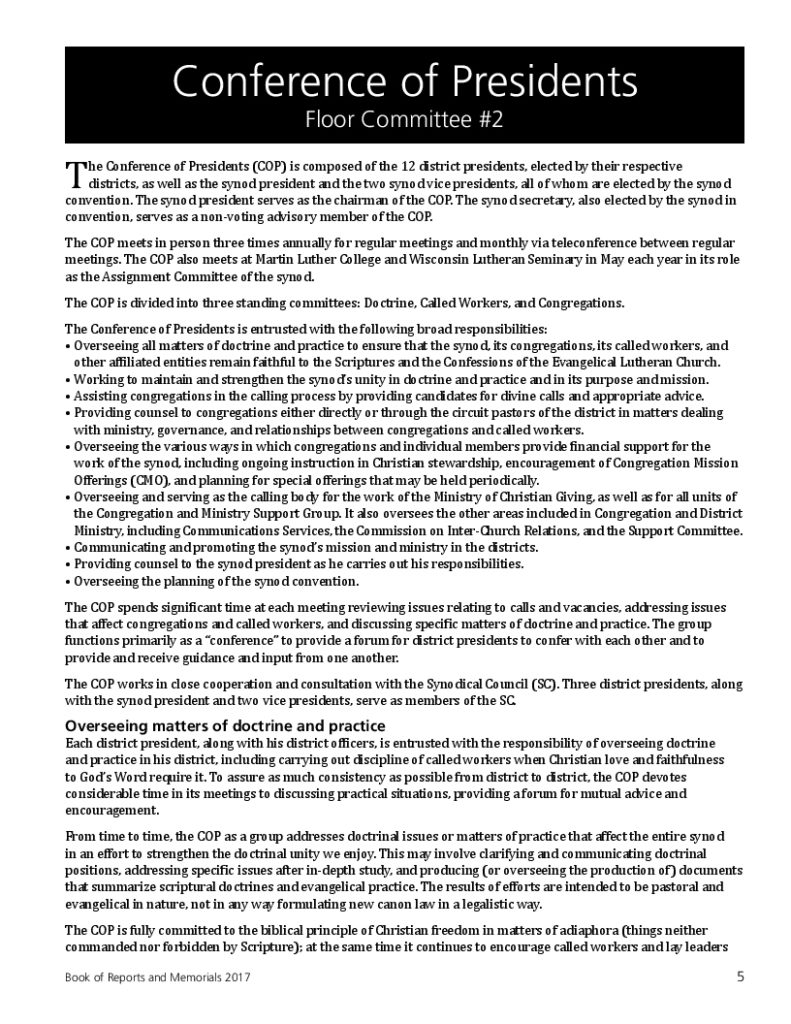
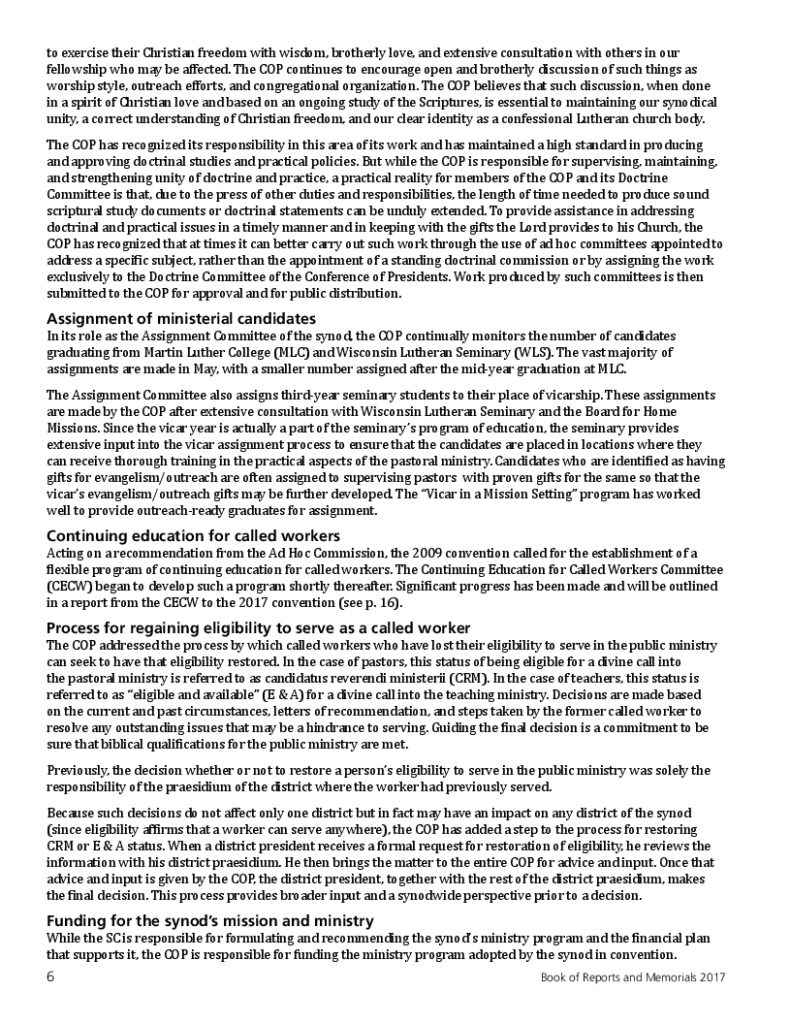
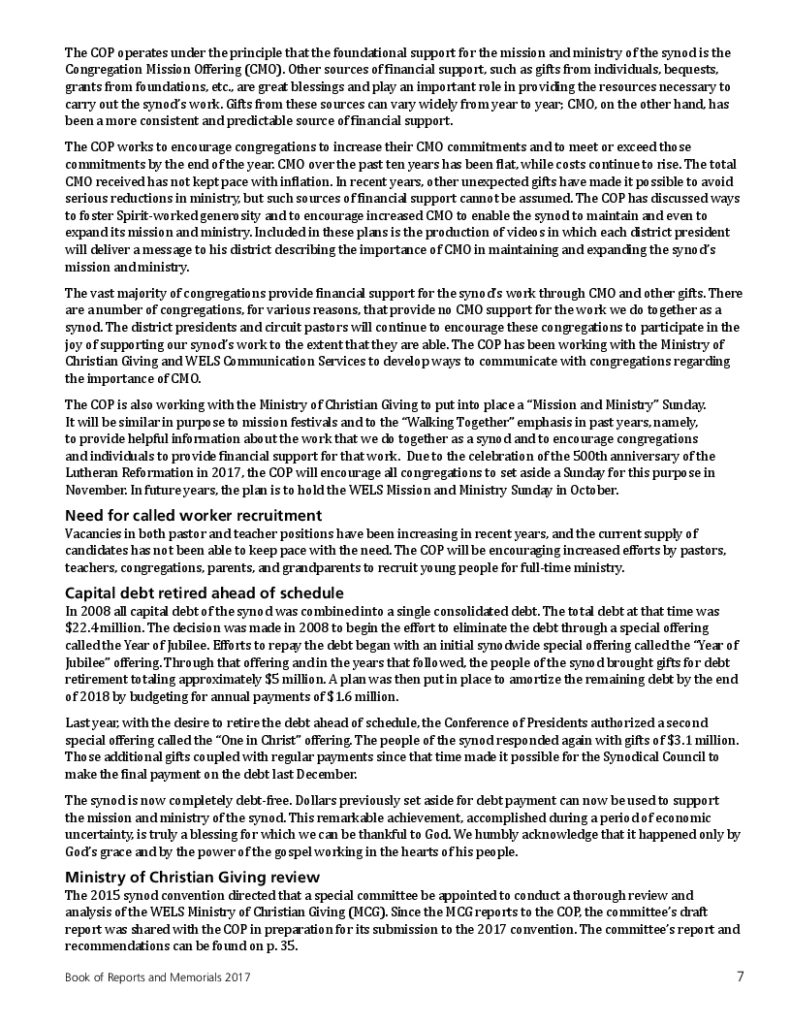
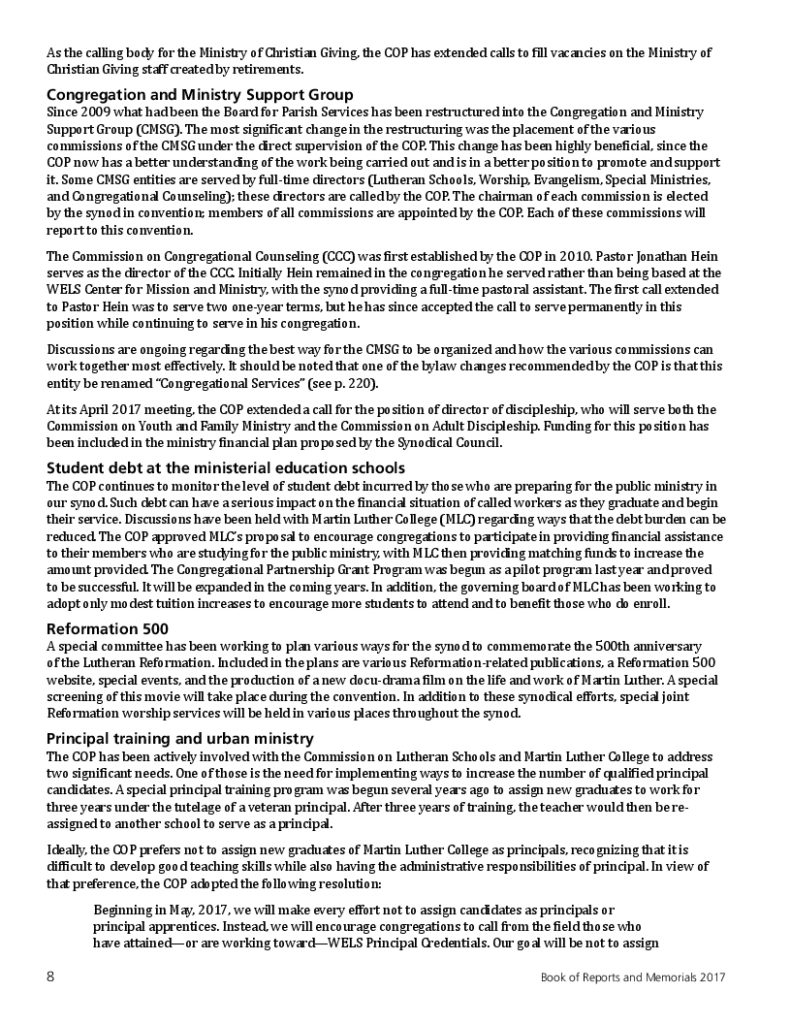
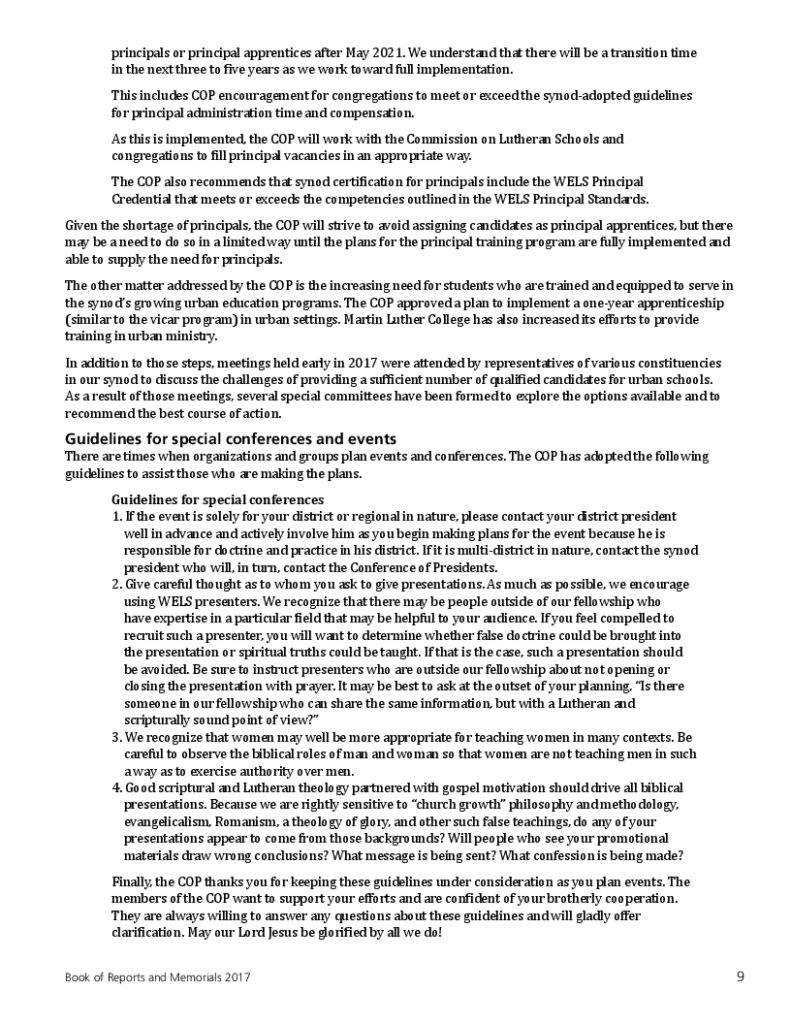


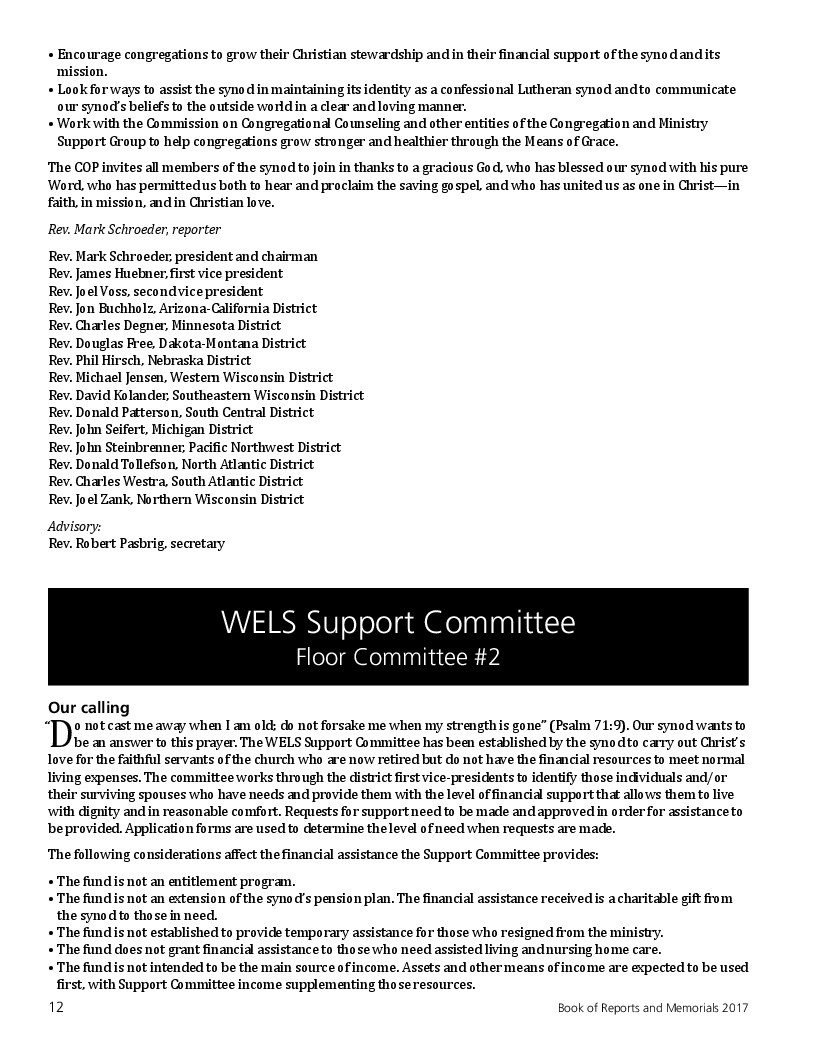
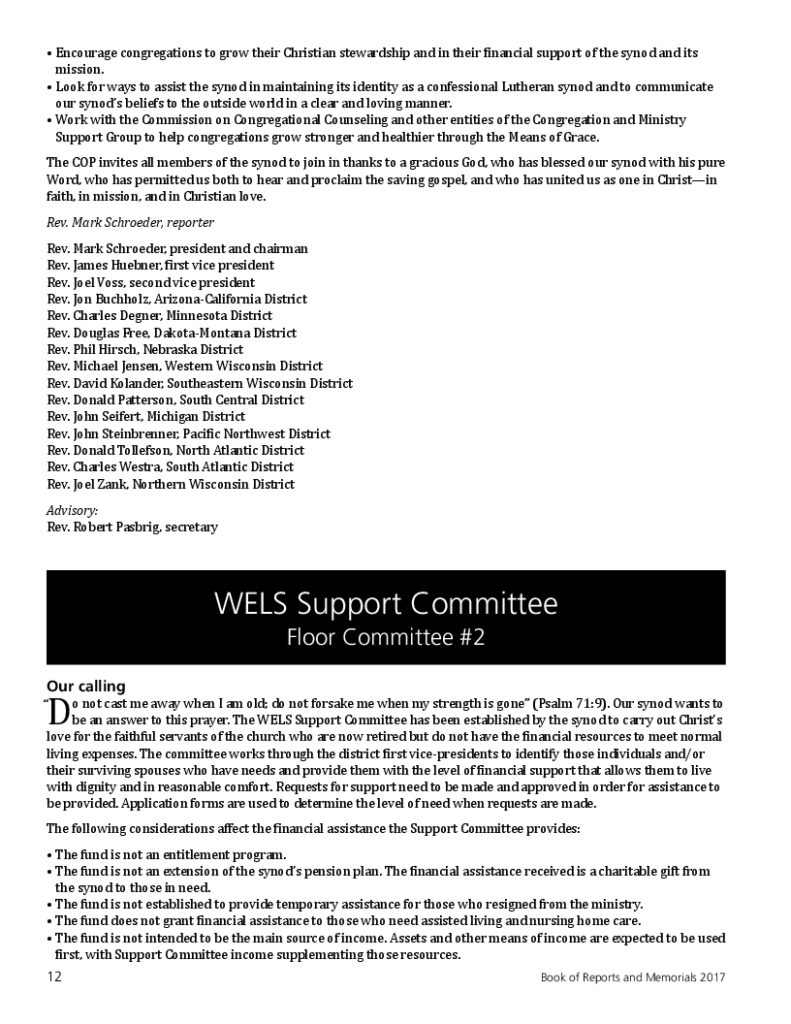
[/su_spoiler]
[/su_accordion]
